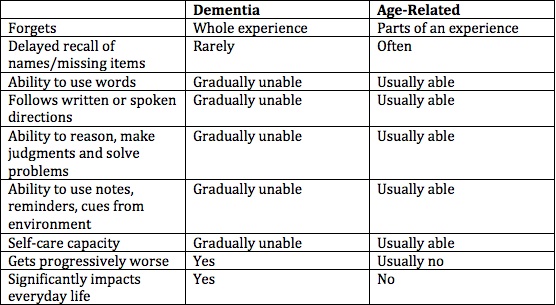
Are you worried that your memory is slipping? You can’t remember someone’s name. You misplaced your keys. You forgot to pay a bill. You took a wrong turn on a familiar road. When things like that happen, the first thing that comes to many people’s minds is Alzheimer’s or some other cause of dementia.
Normal forgetfulness
As we age, it’s normal to experience some degree of memory loss. Normal forgetfulness does not seriously interfere with your work or everyday activities. When it’s caused by dementia it does. According to the “experts” normal forgetfulness is occasionally not remembering such things as:
- names or appointments
- “tip of your tongue” information
- where you put your keys or glasses
There are also some common things that can affect memory but are not related to age or dementia:
- Inattention
- Vision or hearing deficits
- Illness, fatigue, or stress
- Substance abuse
Another thing to bear in mind is that with dementia, memory loss is usually not the only sign that something is wrong.
Dementia warning signs
- Memory loss that disrupts daily life.
- Challenges in planning or solving problems.
- Difficulty completing familiar tasks at home, at work, or at leisure.
- Confusion with time or place.
- Trouble understanding visual images and spatial relationships.
- New problems with words in speaking or writing.
- Misplacing things and losing the ability to retrace steps.
- Decreased or poor judgment.
- Withdrawal from work or social activities.
- Changes in mood and personality.
Fortunately, many causes of dementia are reversible.
Reversible causes of dementia
- Depression
- Infections
- Dehydration or malnutrition
- Alcohol abuse
- Vitamin deficiency
- Medication complications
- Metabolic imbalance
The sooner the cause of dementia symptoms is known the sooner treatment can begin. Even people with Alzheimer’s disease, which tops the list of irreversible causes of dementia, may benefit from medications in the early stages.
Irreversible causes of dementia
- Alzheimer’s disease (50%)
- Vascular dementia, usually caused by strokes (20%)
- Both Alzheimer’s and vascular dementia (20%)
- Rare disorders, such as frontotemporal dementia, Lewy body dementia, Creutzfeldt-Jakob disease, or Huntington’s disease.
Remember — forgetting doesn’t automatically mean dementia
This chart is useful in helping people distinguish between normal memory loss that comes with age and memory loss caused by dementia.
If you have questions or are worried that you or someone you care about has any of the warning signs, you should make an appointment to see your doctor for an evaluation.
More information
I’ve written a number of blog posts and podcast episodes about Alzheimer’s over the years. Here are a few that might be helpful:]


Leave A Comment